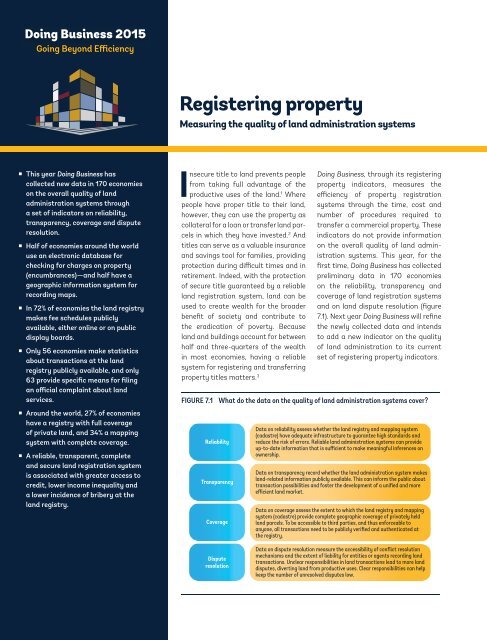bc8G2-7
bc8G2-7
bc8G2-7
Create successful ePaper yourself
Turn your PDF publications into a flip-book with our unique Google optimized e-Paper software.
Doing Business 2015<br />
Going Beyond Efficiency<br />
Registering property<br />
Measuring the quality of land administration systems<br />
• This year Doing Business has<br />
collected new data in 170 economies<br />
on the overall quality of land<br />
administration systems through<br />
a set of indicators on reliability,<br />
transparency, coverage and dispute<br />
resolution.<br />
• Half of economies around the world<br />
use an electronic database for<br />
checking for charges on property<br />
(encumbrances)—and half have a<br />
geographic information system for<br />
recording maps.<br />
• In 72% of economies the land registry<br />
makes fee schedules publicly<br />
available, either online or on public<br />
display boards.<br />
• Only 56 economies make statistics<br />
about transactions at the land<br />
registry publicly available, and only<br />
63 provide specific means for filing<br />
an official complaint about land<br />
services.<br />
• Around the world, 27% of economies<br />
have a registry with full coverage<br />
of private land, and 34% a mapping<br />
system with complete coverage.<br />
• A reliable, transparent, complete<br />
and secure land registration system<br />
is associated with greater access to<br />
credit, lower income inequality and<br />
a lower incidence of bribery at the<br />
land registry.<br />
Insecure title to land prevents people<br />
from taking full advantage of the<br />
productive uses of the land. 1 Where<br />
people have proper title to their land,<br />
however, they can use the property as<br />
collateral for a loan or transfer land parcels<br />
in which they have invested. 2 And<br />
titles can serve as a valuable insurance<br />
and savings tool for families, providing<br />
protection during difficult times and in<br />
retirement. Indeed, with the protection<br />
of secure title guaranteed by a reliable<br />
land registration system, land can be<br />
used to create wealth for the broader<br />
benefit of society and contribute to<br />
the eradication of poverty. Because<br />
land and buildings account for between<br />
half and three-quarters of the wealth<br />
in most economies, having a reliable<br />
system for registering and transferring<br />
property titles matters. 3<br />
FIGURE 7.1<br />
Reliability<br />
Transparency<br />
Coverage<br />
Doing Business, through its registering<br />
property indicators, measures the<br />
efficiency of property registration<br />
systems through the time, cost and<br />
number of procedures required to<br />
transfer a commercial property. These<br />
indicators do not provide information<br />
on the overall quality of land administration<br />
systems. This year, for the<br />
first time, Doing Business has collected<br />
preliminary data in 170 economies<br />
on the reliability, transparency and<br />
coverage of land registration systems<br />
and on land dispute resolution (figure<br />
7.1). Next year Doing Business will refine<br />
the newly collected data and intends<br />
to add a new indicator on the quality<br />
of land administration to its current<br />
set of registering property indicators.<br />
What do the data on the quality of land administration systems cover?<br />
Data on reliability assess whether the land registry and mapping system<br />
(cadastre) have adequate infrastructure to guarantee high standards and<br />
reduce the risk of errors. Reliable land administration systems can provide<br />
up-to-date information that is sufficient to make meaningful inferences on<br />
ownership.<br />
Data on transparency record whether the land administration system makes<br />
land-related information publicly available. This can inform the public about<br />
transaction possibilities and foster the development of a unified and more<br />
efficient land market.<br />
Data on coverage assess the extent to which the land registry and mapping<br />
system (cadastre) provide complete geographic coverage of privately held<br />
land parcels. To be accessible to third parties, and thus enforceable to<br />
anyone, all transactions need to be publicly verified and authenticated at<br />
the registry.<br />
Dispute<br />
resolution<br />
Data on dispute resolution measure the accessibility of conflict resolution<br />
mechanisms and the extent of liability for entities or agents recording land<br />
transactions. Unclear responsibilities in land transactions lead to more land<br />
disputes, diverting land from productive uses. Clear responsibilities can help<br />
keep the number of unresolved disputes low.


